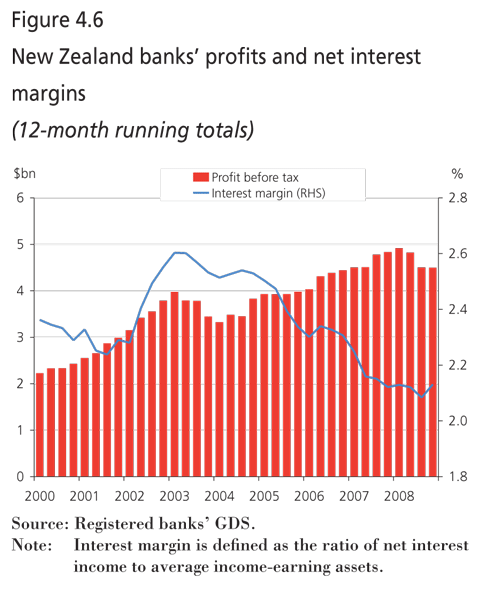Reserve Bank Deputy Governor Grant Spencer said yesterday he was disappointed that the banks had yet to pass on the 50 bps cut in the Official Cash Rate on April 30. His comments gave politicians the green light to comment again on bank profits and whether they should pass on the OCR cuts to borrowers. Asked by journalists after Spencer's comments what he thought of banks not passing on the rate cuts while making NZ$4.5 billion in profits in the last year, Finance Minister Bill English was quoted as saying: "I think it would help the banks if they explained fully to their borrowers just why interest rates are at the level they are at." "It [NZ$4.5 billion] is a big profit and we would expect that in the next financial year they will be less profitable," he said. "We've made it clear right through with the banks that with taxpayers supporting them and their depositors and their overseas borrowings, we expect that they will give borrowers a fair go." Meanwhile Colin Espiner in The Press quoted Labour finance spokesman David Cunliffe as saying major banks' profit margins had hardly moved since the recession hit. "Some banks, according to the Reserve Bank, have not been passing on the cut to the official cash rate at all, leaving hardworking Kiwi families to bear the whole load, while billions of dollars of profits are being made," Cunliffe told a select committee hearing where Spencer repeated his comment about being disappointed with the banks. "When the New Zealand taxpayer is underwriting banks through extensive guarantees, stimulatory fiscal policy and expansionary monetary policies, it is high time that New Zealand's major banks demonstrated a clearer sense of responsibility to this market and their clients," he said. What I think I'm surprised the banks have refused to pass on at least some of the OCR cut to floating rate mortgage holders. The funding for those mortgages is more closely tied to the OCR than fixed rate mortages. Yet it is the 6 month and 1 year rates where some of the banks have cut rates. See all the bank mortgage rates here.
Anyone who broke their fixed rate late last year or early this year in the expectation that any OCR cuts would be passed on in lower floating mortgage rates would be justifiably grumpy. The banks are effectively subsidising their fixed rate borrowers, particularly for 6 months and 1 year, by keeping rates high for floating rates. However, the whole accusation that banks are gouging customers with unrealistically high profits by not passing on the OCR rates is much more complicated. The cost of funding for mortgages is melting pot of all sorts of costs, including international funding costs, local term deposit costs and local wholesale funding. Dipping into that melting pot and pulling out apples to compare with apples is very difficult. The best way to work out whether the banks are profit gouging is to look at their overall net interest margin. The Reserve Bank has done this in its Financial Stability Report released yesterday on page 30 on figure 4.6. It shows the net interest margin as a percentage of assets has fallen to 2.13% by December from 2.31% two years earlier, but is up from a low of 2.08% in the September quarter of last year. Total profits have also fallen from a high of NZ$4.92 billion in the year to the March quarter of last year to NZ$4.49 billion in the year to the December quarter.  We do have more recent data directly from three of the four big banks. Westpac's margins rose slightly in the March quarter, while ANZ National and BNZ's margins fell in the March quarter. Westpac's net interest margin increased to 225 basis points in the six months to March 31 from 216 basis points in the six months to the end of September. In the same period a year ago Westpac's net interest margin was 217 basis points.
We do have more recent data directly from three of the four big banks. Westpac's margins rose slightly in the March quarter, while ANZ National and BNZ's margins fell in the March quarter. Westpac's net interest margin increased to 225 basis points in the six months to March 31 from 216 basis points in the six months to the end of September. In the same period a year ago Westpac's net interest margin was 217 basis points.

We welcome your comments below. If you are not already registered, please register to comment
Remember we welcome robust, respectful and insightful debate. We don't welcome abusive or defamatory comments and will de-register those repeatedly making such comments. Our current comment policy is here.